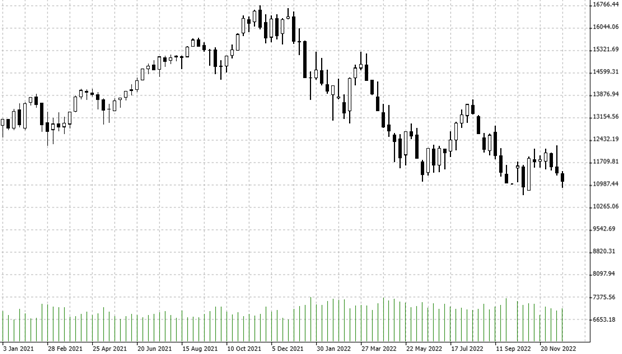

01.01.2023 – One of the most important events in the financial market in the new year is likely to be the end of the tightening. Of course, the world is primarily looking at the Federal Reserve. However, it has recently made it clear that interest rates will remain “higher for longer”. Nevertheless, the investment community is waiting for the “pivot” – the turning point in monetary policy.
Everything remains unclear. Those betting on an early end to tightening could be disappointed. After all, at around 7 percent, the U.S. inflation rate is still miles away from the Fed’s target of 2 percent. High-tech stocks are particularly dependent on interest rate developments; here is a look at the weekly chart of the Nasdaq 100.

Source: Bernstein Bank GmbH
Presumably, the Fed will verbally prepare its pivot if it really comes. So if statements from Fed officials pile up announcing the end of rate hikes, prices should rally strongly. The same applies if the Fed sets its target for inflation upward, for example to 3 percent.
The R-word
On the bear side, one factor has not yet been properly priced in. Namely, the fact that there could well be a hard landing in the economy, i.e. a recession. “It’s rare to impossible for the Fed to navigate a soft landing. So, preparing for the worst regarding your emotional response to market volatility is best,” judged Richard Rosso of RealInvestmentAdvice.com. He recommended swimming against the tide: “Next year, we may find our emotions in the basement of capitulation and then discouragement. At these times, we should commit capital to stocks (just when we don’t want to).”
By the way, even a pivot could become a bull trap. For example, James Steven Chanos, founder of investment advisor Kynikos Associates in New York City, recently pointed out this factlet on Twitter, “…the Fed ‘pivoted’ a full year before Lehman…”. Our verdict: Of course the Fed will move the market again. And high-tech stocks are likely to react particularly strongly – because these stocks are often still quite young startups that live off loans. Ergo, the interest rate issue has a particularly strong impact here. So pay attention to the real-time news: In the back and forth between statements from the central bank and the Consumer Price Index, a trend should be discernible. Bernstein Bank wishes you successful trades and investments!
__________________________________________________________________________________________
The content of this publication is for general information purposes only. In this context, it is neither an individual investment recommendation or advice nor an offer to purchase or sell securities or other financial products. The content in question and all the information contained therein do not in any way replace individual investor- or investment-oriented advice. No reliable forecast or indication for the future is possible with respect to any presentation or information on the present or past performance of the relevant underlying assets. All information and data presented in this publication are based on reliable sources. However, Bernstein Bank does not guarantee that the information and data contained in this publication is up-to-date, correct and complete. Securities traded on the financial markets are subject to price fluctuations. A contract for difference (CFD) is also a financial instrument with leverage effect. Against this backdrop, CFD trading involves a high risk up to the point of total loss and may not be suitable for all investors. Therefore, make sure that you have fully understood all the correlating risks. If necessary, ask for independent advice. CFDs are complex instruments and are associated with the high risk of losing money quickly because of the leverage effect. 68% of retail investor accounts lose money trading CFD with this provider. You should consider whether you understand how CFD work and whether you can afford to take the high risk of losing your money.7
